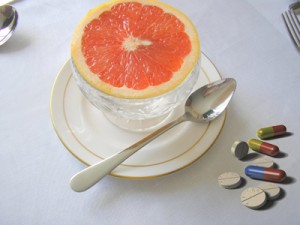When patients are prescribed different medications they often receive strict guidelines from their doctors about how to safely use these medications in order to avoid potential health hazards and serious side effects that can be caused by drug interactions. Although medicine-users are informed of the dangers of certain drug combinations, few know of the real menace that may be waiting unsuspectingly at home in their refrigerators or on their countertops. This threat is none other than the unsuspecting grapefruit.
The grapefruit may seem like a harmless, tasty treat, but when ingested along with other medicines, this fruit can turn into a destructive force. But how can a grapefruit interact with drugs?
When grapefruit juice is consumed, it interferes with CYP3A4 enzymes in the intestines that are responsible for breaking down medicine. This can result in a buildup of drugs in you r system and can lead to a drastic increase in side effects, even becoming toxic. As a result, patients could develop more severe conditions such as rhabdomyolosis (breakdown of muscle fibers) and serious kidney disorders.
r system and can lead to a drastic increase in side effects, even becoming toxic. As a result, patients could develop more severe conditions such as rhabdomyolosis (breakdown of muscle fibers) and serious kidney disorders.
Although not all prescription drugs interact with grapefruit, many commonly used medications do. Medications that may be intensified with consumption of grapefruit include, but are not limited to, those used for blood pressure, heart disorders and lowering cholesterol, calcium channel blockers (including Calan), antihistamines, pain relievers, treatments for mental illnesses, and drugs that affect the intestines or immune system. Grapefruit can even interact with erectile dysfunction medicines, such as Levitra, and can cause too much medication to be absorbed by the blood.
With countless medications that can become harmful when taken with any form of grapefruit, patients must use particular caution when it comes to their diet. If the drug you are using may be affected, it is important that you do not consume grapefruit. According to research, grapefruit may even be active in the body for as long as 24 hours and side effects can last for up to three full days. New studies also show that Pomelos and Seville oranges could cause similar complications.
So before pouring another glass of grapefruit juice for breakfast, be certain that the medicines you are taking will not be affected by this seemingly harmless decision. If you are unsure whether eating this fruit could be risy, do not hesitate to ask your doctor or check the “drug-food interaction” label on the medicine. Stay informed; avoiding dangerous interactions could prevent serious damage and even death.
0."/>